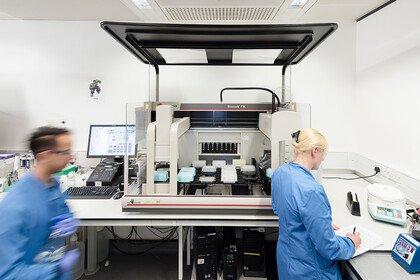
Lab leaders must create open and safe spaces to improve research culture
Talking openly about the issues in research culture can cause quite a bit of fear and resentment, but I think this is part of the profit. It’s important that there are open and safe spaces to have these discussions.

I'm a research group leader and professor of computational and optical biophysics at University College London (UCL), where I’m also the co-director of a Wellcome PhD programme in science.
I really believe that excellent science and a healthy research culture can exist side by side. This philosophy is at the heart of our PhD programme – we aim to support the personal and professional development of students from all backgrounds at recruitment, during, and after their PhDs.
It needs to be easier for people to speak out
We have an equality, diversity and inclusion committee in my department at UCL, which openly discusses research culture and tries to improve things. The committee has been up and running for several years, and grew out of a group that focused initially on gender equality through the Athena SWAN charter. We currently hold an Athena SWAN gold award – the first at UCL.
One of the things we’ve put in place is an anonymous system where students and researchers can say if they’re under pressure, have been bullied, or don’t feel comfortable with their research environment. This is vital. As Wellcome’s recent survey reports, bullying is commonplace in research – 61% of researchers have witnessed bullying or harassment, and 43% have experienced it. We also know it can be difficult to speak out – in the survey, 37% said they would not feel comfortable doing so.
An obvious problem is that researchers’ careers are dependent on their principal investigators (PIs). There’s so much dependence on references, which are written by PIs, that speaking out could directly affect someone’s career. That’s why it's important to anonymise.
In our department, when a researcher has a dispute or problem, they can talk with someone in confidence. From there a plan can be formulated. The team have also had awareness training, which has helped us to recognise if behaviour falls short and to gain confidence in calling it out on behalf of others.
Policies on bullying and harassment are definitely a good thing, but we also need to work on the middle ground to stop things getting there. This includes the day-to-day relationships and what can be done to correct smaller actions before they escalate. In many cases, I believe that people aren’t aware of the detrimental effect they’re having on another person – if it’s drawn to their attention they might be very willing to change.
A lack of training is a problem in research
Less than half of the managers in the survey said they had received training on people management. A broader lack of training is one of the biggest problems in research. We get promoted to PI or group leader because of being an outstanding scientist, and all of a sudden are expected to be outstanding in finances and in managing people.
I feel that at an early stage, researchers are trained to be excellent scientists but not to be leaders in the lab. We could have management training at PhD or postdoc level. Even for those who do not progress in research, these are transferable skills that would be useful elsewhere.
I remember the first time I got a £500,000 grant and felt that it was a lot of funding and responsibility. It is, of course, but I soon realised that it takes a great deal of planning. Research budgets have to be planned out over three to five years and there are different pots to keep an eye on. It’s quite harsh to expect people to be outstanding researchers and then to do all these other things without any previous instruction.
There’s too much pressure to work long hours
Long hours also feature in Wellcome’s survey, and this doesn’t surprise me. It seems to be a part of the research world. Many researchers try to reach a senior position, sacrificing their family life to get there. Personally, I was nervous about starting a family and would have liked to start earlier, but was afraid I would stop being competitive.
I know that my academic life has affected my family. We ask a lot of our partners because we can signal in many ways that the profession is more important than our relationships. The reality of having children is that there’s a specific hour you have to collect them from day care, but most of us only have the chance to leave on time when we get tenure. Only certain people can have a family life after 5.30pm because they have security in their jobs.
The Wellcome research culture survey caused quite a buzz. It’s a topic that’s increasingly discussed and people have ideas to improve the situation. Having a campaign to get behind should really get things moving. If you want to contribute, there are forums to discuss ideas and a series of meetings planned to discuss these. I hope this generates momentum and brings us to a healthier research culture.


